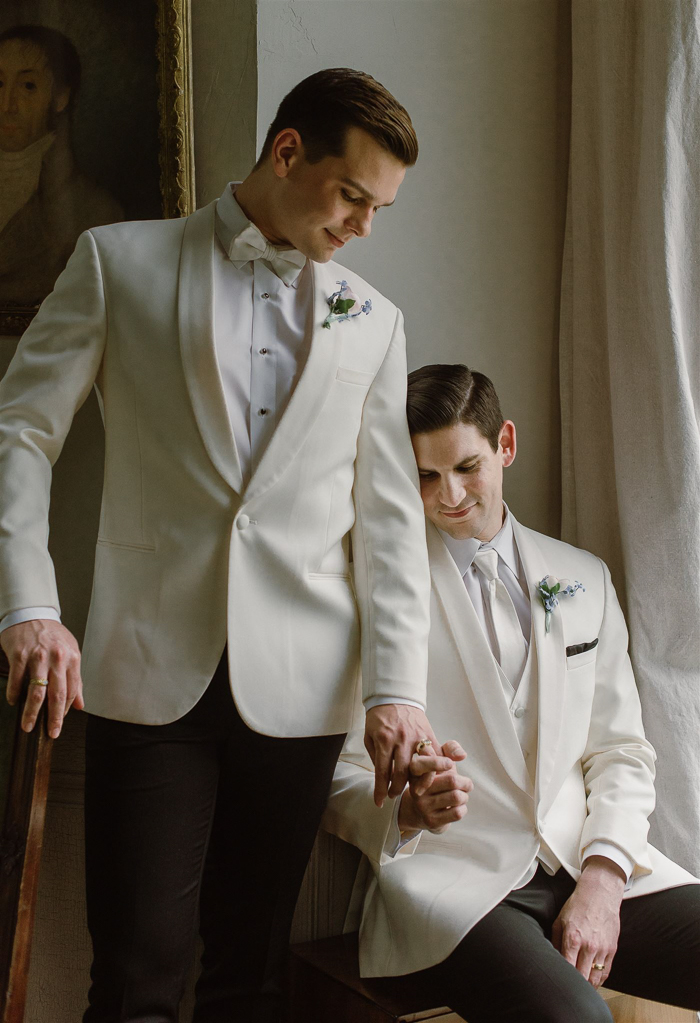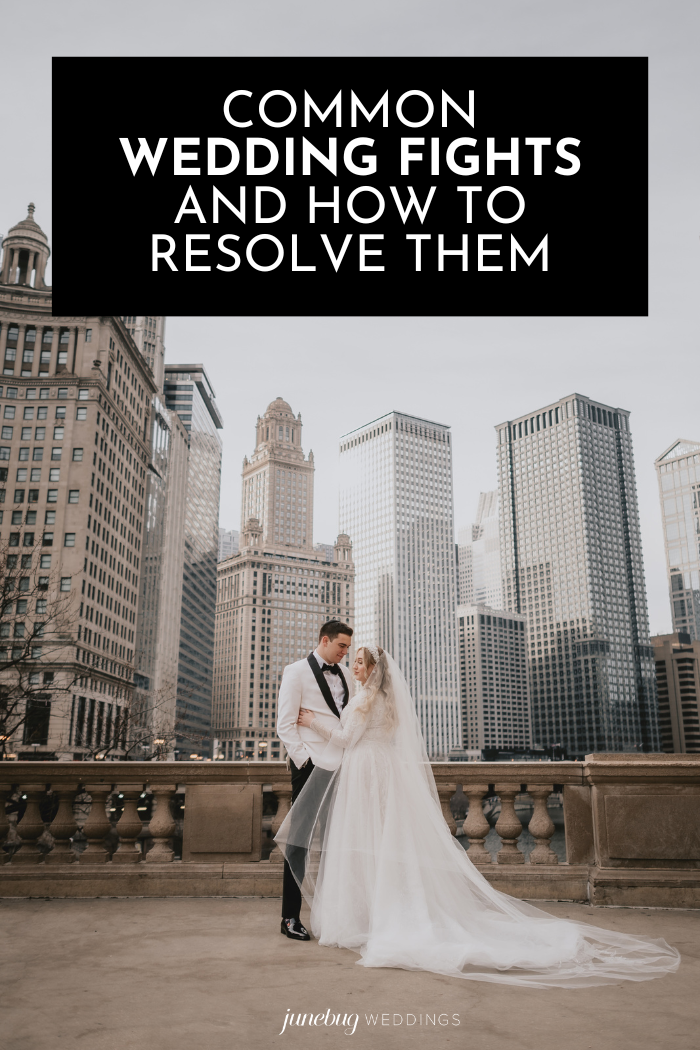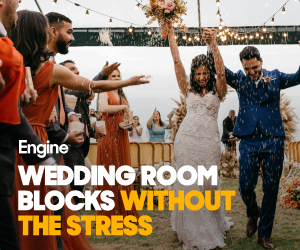
Image by Kelly Mossop Photography. Keep scrolling for the most common wedding fights and how to resolve them.
Wedding planning is exciting but can also be stressful and emotional for couples. It’s not unusual for conflict to arise during the planning process—from disagreements over the guest list to debates about the wedding budget. Whatever the case, take comfort in knowing that you probably aren’t the first to argue it out with your partner or loved ones before the big day.
The question is, how do you navigate them? You can resolve conflict during the wedding journey with patience, open communication, and willingness to make concessions. And we’re sharing with you our insights on the most common wedding fights and what you can do to work them out.

Image by Made In The Mountains Photo
Common Wedding Fights
Finances
Making decisions about money isn’t easy, especially when it involves a lot of money. So, of course, seeing all the costs add up to a hefty price tag can cause some tension. It’s important for couples to set a budget early on in the planning process and to stick to it as much as possible. This may require some compromise and negotiation, but it’s essential to avoid financial stress in the long run.
Discuss how involved parents or others will be in financial decisions if they’re helping fund your wedding. Before accepting a financial present from someone, determine whether you can use it at your discretion or if it’s intended for a certain purpose. Planning a wedding you can afford on your own may be the best option if the gift comes with uncomfortable conditions.
Guest List
One of the most frequent sources of conflict is the guest list. Couples may have different ideas about who should be invited to the wedding, leading to arguments over who should be included and who should be left off the list. Family members may feel hurt or offended if they aren’t invited to the wedding. It’s crucial for couples to communicate honestly with their families about their guest list expectations and to try to find a middle ground that works for everyone.
Having Opposing Views
You may want a more traditional wedding while your partner wants something more relaxed. Or vice versa. Whatever the case may be, as you begin the nitty-gritty of planning, you may find yourself battling with each other and having completely opposing ideas about how you want your wedding to look and feel. It’s often one of the first arguments you need to play out. Take a breath, stay calm, and take turns discussing your ideas and reaching a compromise before moving forward.
Sharing The Load
One partner feels they’re doing all the work, while the other simply agrees with everything the other says. Before you know it, your disagreements are quickly intensifying, leading to a major meltdown at some point during the planning phase. Be sure to communicate from the get-go about expectations so one person doesn’t feel like they’re carrying all the load.
From large ideas to little details, jot down your thoughts and identify what’s most important to you for the big day and what’s not. After that, discuss your list and talk it out. As you find tasks you prefer, divide them to create a better balance. Doing this will make you feel more involved in wedding preparations and give you the opportunity to do something you care about.
Family Expectations
For many couples, prioritizing their wedding vision may mean skipping family or cultural traditions. So conflict is expected to arise when family expectations compete with the couple’s wishes. Before diving too far into planning your wedding:
- Think about what you and your partner want
- Talk honestly about your family’s traditions and expectations
- Agree on how you want to include these aspects into your big day
Clashing With Your In-Laws
Marriage isn’t just between two people. It’s the merging of two families as well. So, when two families become one, there may be problems that you can’t avoid. And you, unfortunately, might have to deal with difficult in-laws or other family members. Every family has different dynamics and every situation is unique. But it’s no secret that this can affect your relationship, health, and well-being.
So when things are getting too stressful and you’re not sure how to handle the person who is a big part of your future, it may be helpful to put things on pause. Take a step back from communicating with them and doing any wedding planning at all. When you’re in a better head space, it may be easier to talk directly with your in-laws to find common ground.
Appropriate limits are the cornerstone of our self-respect and one of the pillars of every healthy relationship. Setting boundaries is essential, but maintaining them is even more crucial. Make sure your in-laws understand your comfort level and your limitations. And don’t be afraid to stand by your principles, even if it means saying “no” to them. Keep the lines of communication open with everyone, uphold your limits, and just take a deep breath for the sake of your sanity.
Other People’s Opinions
People may offer unsolicited advice because they’re excited about your wedding and genuinely want to help but don’t understand that their comments can make you feel burdened or overwhelmed. As the advice and opinions roll in, what do you do about all those comments? Thankfully, many people who say things like this may only do it once or twice in passing and then stop talking about it. And the best thing to do is smile, nod, and move on.
But when people in your inner circle tell you what they think, it can be hard to deal with their strong opinions. Not all advice is equal, and it’s important to consider the source and their motivations. Consider whether they align with your wedding vision. By being mindful of whose advice you value, you can ensure that you receive information and support that’s relevant and meaningful to you.
Second Marriages And Blended Families
Blended families often have unique challenges, especially regarding how people feel about their children, ex-partners, or spouses. When planning a second marriage, it may be essential to consider an ex-spouse,any children from a previous marriage, and how things work with adult children. Does your new partner get along with your kids? Do your kids from your previous relationships get along? Planning a wedding can also lead to important talks about where you’ll live, your finances, and who will have custody of your children.

Image by LeeAnn B Stephan
Tips On How To Resolve Common Wedding Fights
Identify The Source Of The Problem
Finding the cause of a disagreement is the first step to solving it. Once the problem is clear, it is easier to devise a solution that works for everyone. You may need to make a compromise, but before doing so, all options should be discussed and weighed. Wedding planning conflicts can be solved if everyone focuses on the problem at hand and works together.
Communicate Openly And Honestly
Open and honest communication is critical during wedding planning. It helps establish clear expectations, avoid misunderstandings, and build trust. It’s also an opportunity for you to express your thoughts, feelings, and ideas–leading to a more collaborative and productive relationship. Throughout your planning journey, set aside time for regular check-ins where you can address issues as they arise. This helps to prevent small problems from escalating into larger conflicts.
Set Clear Boundaries And Expectations
If setting boundaries isn’t your strong suit, you might be nervous about setting limits with your family and your partner’s family. Sit down with your partner and discuss the things that you can’t give up. It’s important to communicate your expectations clearly (respectfully and kindly) as soon as possible. Your loved ones are more likely to want you to have the best day ever and will respect your boundaries.
But what if you encounter resistance? Set the proper limits based on the situation, and let them know what you need so that those limits are respected. It’s important to listen to what they have to say and let them know what you think as well. Often, the hard-to-get-along-with loved one just wants to be heard.
Choose Your Battles
Not every issue is worth fighting over, and it’s vital to prioritize what’s truly important. By focusing on the bigger picture, couples can avoid getting bogged down in minor disagreements and stay focused on what truly matters. Not everything will be worth your time and energy. While certain issues merit debate and discussion, it’s usually wise to move past others. Save your energy for organizing your big day and taking care of your mental health. Pick your battles wisely and try not to worry about the little things.
Lean On Your Wedding Planner
If you hire a seasoned wedding planner, there’s a good chance they have stories about how they dealt with challenges while planning a wedding. Don’t be afraid to ask them for help because it’s likely that they’ve been there. They may have some wise words or similar past situations to help guide you through yours. Most wedding planners have thick skin, too. They may not mind taking responsibility for certain wedding-related decisions to keep you out of the hot seat, like helping with seating, who gets invited, or anything else that might upset other people.
Seek The Help Of A Professional
Getting help from a professional can be a good way to solve problems when planning a wedding. This can be a wedding planner, a counselor, or a mediator. They bring impartiality, experience, and professional skills to the table, which helps to solve conflicts in a calm, objective, and effective way. They can help people talk to each other, settle disagreements, and come up with creative solutions that work for everyone.
Remember What’s Really Important
It’s easy to get lost in the details, but it’s important to remember why the wedding is happening in the first place. Your wedding and marriage are about the two of you. You and your spouse-to-be are a team. At the end of the day, no matter how stressful things get, it’s not about the flowers and decor or who sits where at the reception. The most exciting thing is that you and your best friend promise to be there for each other for the rest of your lives.

Image by Iron + Honey Photography















.jpg)



This is so very helpful – so many helpful tips to avoid the conflict or solve it quicker.